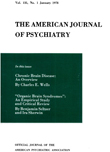Hyperkinetic/aggressive boys in treatment: predictors of clinical response to methylphenidate
Abstract
Data on 84 nonretarded boys aged 6--12 with the hyperkinetic/MBD syndrome were drawn from a comprehensive, longitudinal investigation in the interest of identifying factors that contribute significantly to variation in clinically rated improvement during treatment with methylphenidate. The size of the multiple correlation (R = .50) indicates that 25% of the variation in the children's response to methylphenidate is jointly predictable from age at referral, degree of perinatal complications, and score on the hyperactivity factor. The authors discuss stepwise multiple regression analysis as the method of choice in drug response prediction studies and the possible effects on the results of such studies of differing definitions of improvements.
Access content
To read the fulltext, please use one of the options below to sign in or purchase access.- Personal login
- Institutional Login
- Sign in via OpenAthens
- Register for access
-
Please login/register if you wish to pair your device and check access availability.
Not a subscriber?
PsychiatryOnline subscription options offer access to the DSM-5 library, books, journals, CME, and patient resources. This all-in-one virtual library provides psychiatrists and mental health professionals with key resources for diagnosis, treatment, research, and professional development.
Need more help? PsychiatryOnline Customer Service may be reached by emailing [email protected] or by calling 800-368-5777 (in the U.S.) or 703-907-7322 (outside the U.S.).



